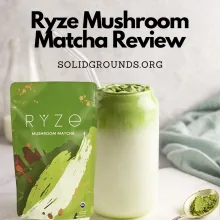Is Mushroom Coffee Good For You? | Solid Grounds
Mushroom coffee is a trendy beverage that combines the caffeine boost of regular coffee with the functional benefits of medicinal mushrooms like chaga, cordyceps, lion’s mane, and reishi. By blending dried mushroom powders with coffee beans, creates a smoother, healthier brew that offers sustained energy, increased productivity, reduced brain fog, and anti-inflammatory effects.
Medicinal mushrooms contain compounds like beta-glucans, terpenoids, and polysaccharides that provide measurable cognitive, immune, and gut health benefits. Compared to basic coffee, mushroom coffee offers greater nutritional diversity, neuroprotective agents, and cellular health enhancements, making it a functional superfood upgrade for health-conscious consumers seeking a convenient way to access the time-tested benefits of medicinal mushrooms.
Our #1 Recommended Mushroom Coffee | Our #2 Recommended Mushroom Coffee |
 |  |

Exploring if mushroom coffee is good for you
For most professionals, that first steaming cup of joe makes the modern workday possible. Few habits seem as ingrained as rushing through morning routines just to chug down dark roasted caffeine. Yet that jolt and joy fades fast. By 10am meetings, attention and energy levels lag once again. We reach for another hot cup, temporarily pushing aside any nagging doubts about long-term health impacts. But what if your daily coffee offered more than a temporary fix? The rising popularity of mushroom coffee suggests rethinking that mug’s potential. Combining the lift of coffee with brain-boosting fungi is transforming caffeine into a functional superfood.
How Mushroom Coffee Adds Functional Fungi to Your Brew
This trendy beverage simply replaces regular coffee beans with a blend that incorporates dried medicinal mushroom powder or extracts. Species like chaga, cordycep, lion’s mane and reishi impart unique health properties missing from your normal dark roast. Compounds found exclusively in mushrooms called beta-glucans, terpenoids, and other polysaccharides drive measurable benefits for immunity, gut health, and especially cognitive function. By dry milling pieces of the mushroom fruiting body and mycelium into a fine powder, companies create a mixable ingredient to blend with coffee beans. The result is a smoother, healthier coffee that outperforms plain caffeine by balancing energy peaks and valleys.
How Mushrooms Enhance Wellness
Of course, the effects extend beyond stabilizing blood sugar swings from black coffee. Medicinal mushrooms earned their classification from Traditional Chinese Medicine practices centuries ago. And modern research continues confirming traditional beliefs in these fungus’ impact on physical and mental wellbeing. Lion’s mane, named for its long flowing strands, exhibits brain-protecting abilities linked compounds like hericenones. Studies indicate lion’s mane mycelium and fruiting bodies boost nerve growth factor (NGF). NGF plays a crucial role in maintaining and regenerating neurons for better memory, clarity and cognition. Meanwhile, chaga mushrooms contain one of the highest antioxidant concentrations of any food thanks their dense melanin and plant-based polysaccharides. Consuming more antioxidants from supplements like mushrooms enables the body to reduce oxidative damage from free radicals that contribute to inflammation and accelerated aging.
Why Mushroom Coffee Beats a Basic Brew
Compared to a basic cup of joe, mushroom coffee simply offers vastly more nutritional diversity and by extension greater functionality. Those neruoprotective agents and anti-inflammatory compounds translate directly to noticeable perks lacking in conventional coffee: sustained energy, increased productivity, less brain fog and reduced stress. So instead of the short-term stimulation from caffeine wearing off fast, mushroom coffee ingredients continue enhancing cell health after that last sip.
Mushroom Coffee Considerations
Of course, more research still needs to confirm various theorized benefits. And some downsides like possible medication interactions require consideration. Since the base remains coffee beans, caffeine content stays largely the same for those sensitive. But potential heavy metal accumulation can be mitigated by choosing ethical, lab-tested mushroom sources. As public interest in functional foods and nootropics keeps accelerating, look for more specialty coffee roasters to incorporate medicinal mushrooms like lion’s mane into their offerings.
Coffee Drinking’s Higher Calling with Mushroom Infusion
Because based on the compelling indication of cognitive benefits and anti-aging cellular effects, mushroom coffee makes sense as a simple upgrade for productivity seekers, health conscious consumers, remote workers and really anyone dependent on coffee drinking. An incremental shift from regular beans to a reishi or cordycep infused blend allows you to transform an everyday habit into an opportunity to consume a nutrient-dense functional beverage.
So rather than view that next refill as an unhealthy addiction, see it as working smarter by using coffee time to foster better concentration plus higher immunity and vitality. While more studies are still needed, early research confirms what traditional medicine has long praised in medicinal mushrooms – their abiity to enhance lives through better living. Mushroom coffee provides the perfect delivery mechanism to access those time-tested benefits in a convenient format compatible with modern professionals’ lifestyles.
Our #1 Recommended Mushroom Coffee | Our #2 Recommended Mushroom Coffee |
 |  |
FAQs and Answers
Are there any negative side effects to drinking mushroom coffee?
There are a couple potential downsides or considerations with mushroom coffee:
- Possible medication interactions – Since the mushroom extracts contain bioactive compounds, there is a possibility they could interact with certain medications. The article advises this should be considered.
- Heavy metal accumulation – Some mushrooms can accumulate heavy metals from the environment. The article suggests choosing ethical, lab-tested sources to mitigate this potential risk.
- Caffeine sensitivity – Since the base is still regular coffee beans, the caffeine content remains largely the same as plain coffee. So those sensitive to caffeine may still experience issues like jitters or insomnia from the stimulant effects.
Beyond those points, the article does not explicitly mention any other major negative side effects. It focuses more on the potential benefits like sustained energy, cognitive enhancement, and anti-inflammatory effects. But it does note that more research is still needed to fully confirm all the theorized benefits of the mushroom compounds.
So in summary, the main downsides highlighted are potential medication interactions, heavy metal contamination from poor sources, and the same caffeine risks as plain coffee for sensitive individuals. But there aren’t extensive negative effects called out beyond those considerations.
Will mushroom coffee give me the same jittery feeling as regular coffee?
Mushroom coffee is likely to give a similar jittery feeling as regular coffee, at least in the short term after consuming it.
The article states:
“Since the base remains coffee beans, caffeine content stays largely the same for those sensitive.”
This implies that the caffeine level in mushroom coffee is comparable to regular coffee. Caffeine is the main stimulant in coffee that can cause feelings of jitteriness, especially in those who are more sensitive to its effects.
The article also notes that mushroom coffee can provide “sustained energy” compared to regular coffee. However, it does not explicitly state that it completely eliminates the jittery effects of the caffeine, at least initially.
So in the short term right after drinking it, the caffeine hit from the coffee beans is likely to produce a similar jittery sensation as with regular coffee. However, some of the compounds from the medicinal mushrooms, like beta-glucans, may help stabilize blood sugar and provide more sustained, even energy levels over a longer period of time compared to a regular coffee crash.
But the article does not indicate the mushroom extracts would entirely negate the initial jittery effects from the caffeine if you are sensitive to it. Moderation and paying attention to your individual caffeine tolerance would still be advisable with mushroom coffee.
Which mushrooms are best to use for mushroom coffee blends?
The most commonly used and beneficial mushrooms for mushroom coffee blends are:
- Lion’s Mane Mushroom: Described as exhibiting “brain-protecting abilities” thanks to compounds like hericenones. Research indicates lion’s mane boosts nerve growth factor (NGF), which helps maintain and regenerate neurons for better memory, clarity and cognition.
- Chaga Mushroom: Noted for having one of the highest antioxidant concentrations of any food due to dense melanin and polysaccharides. Chaga provides anti-inflammatory and anti-aging benefits by helping reduce oxidative damage.
- Reishi Mushroom: Though not explicitly detailed, reishi is mentioned as one of the species commonly used to impart unique health properties in mushroom coffee blends. Reishi is known as an adaptogenic mushroom that helps the body cope with stress.
- Cordyceps Mushroom: Also listed among the species used to blend with coffee beans for their functional benefits, though specifics are not provided in this article.
So the top mushrooms highlighted are lion’s mane for cognitive enhancement, chaga for high antioxidants, and likely reishi and cordyceps for their adaptogenic stress-reducing and immune-boosting properties. The article suggests combining extracts and powders from these medicinal mushroom species allows the resulting coffee to offer a wider array of health-promoting compounds beyond just caffeine.
Does mushroom coffee taste like mushrooms or just normal coffee?
Mushroom coffee likely has a taste profile that is similar to regular coffee, rather than tasting overtly like mushrooms.
The article states that mushroom coffee is made by blending “dried medicinal mushroom powder or extracts” with regular coffee beans. It does not mention any significant changes to the flavor profile.
Additionally, this line suggests the mushroom additions don’t dramatically alter the taste:
“The result is a smoother, healthier coffee that outperforms plain caffeine by balancing energy peaks and valleys.”
Describing it as a “smoother” coffee implies the mushroom additions don’t impart an overpowering mushroom flavor, but rather enhance and smooth out the existing coffee taste.
The only other clue about the flavor is when it refers to mushroom coffee as “a functional superfood upgrade for health-conscious consumers.” This phrasing suggests the taste is still palatable and acceptable for regular coffee drinkers.
So in summary, while the mushroom extracts provide additional functional benefits, the taste profile is likely still predominately that of a normal coffee thanks to the coffee bean base. The mushroom flavors are likely quite subtle or even imperceptible compared to the robust coffee notes.
Is mushroom coffee more expensive than regular coffee?
Mushroom coffee is likely to be more expensive than regular plain coffee.
A few points from the article suggest mushroom coffee comes at a premium price:
1) It uses additional specialty ingredients beyond just coffee beans – Medicinal mushroom powders and extracts like chaga, cordyceps, lion’s mane, and reishi are incorporated, which adds to the production costs.
2) It offers greater “functionality” and nutritional benefits – The article highlights the “functional superfood” aspects and boosts to cognition, immunity, etc. Products offering enhanced functionality often command higher prices.
3) It’s still a niche/trendy product – The article refers to mushroom coffee’s “rising popularity”, implying it is still a relatively new and novel product without mass-market scale and competition to drive down prices yet.
4) It likely uses higher quality, ethically-sourced mushrooms – The article warns of potential heavy metal risks, suggesting reputable mushroom coffee producers use mushrooms from trustworthy, lab-tested sources, which also adds costs.
So while exact prices aren’t provided, the article’s context implies mushroom coffee is a premium product delivering more benefits than plain coffee at regular grocery prices. The extra specialty ingredients, production, and functionality position mushroom coffee as a more expensive specialty item currently until it reaches greater scale.






